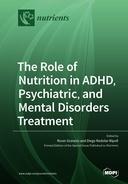Explore

The Role of Nutrition in ADHD, Psychiatric, and Mental Disorders Treatment
0 Ungluers have
Faved this Work
Login to Fave
Attention-deficit hyperactivity disorder (ADHD) is a neurodevelopmental chronic disorder which etiology seems the result of complex interactions between multiple factors, including genetic, biological, and environmental influences. Treatment research has proved that the combination of both medication with behavioral therapy can improve ADHD symptoms; Moreover, recent studies suggest the need for new approaches aimed at the underlying triggers of this complex disorder (such as stress, poor sleep or certain dietary plans), on the basis that making adequate lifestyle changes to minimize these triggers could contribute to better control ADHD symptoms. In this context, studies addressing the efficacy of nutrition on the developmental course of ADHD observe that deficiencies in certain types of foods can worse the symptoms of attention deficit, hyperactivity, and impulsivity, while adequate dietary plans could optimize brain functions. Nevertheless, the specific causal pathways of the dietary styles adjuvant for medication and psychotherapies contributing to prevent/reduce ADHD symptoms are largely unknown, as well as the long-term effects. This book includes evidence of the potential contribution of the nutrition styles on the treatment outcomes of individuals with ADHD and other frequent mental-psychiatric disorders across development, and the underlying mechanisms explaining the direct and mediational effects. The contents of this book could contribute to the elaboration of guidelines/recommendations for improving caring capacity of healthcare practitioners and family caregivers.
This book is included in DOAB.
Why read this book? Have your say.
You must be logged in to comment.
